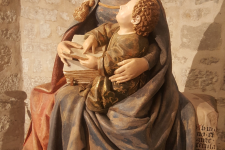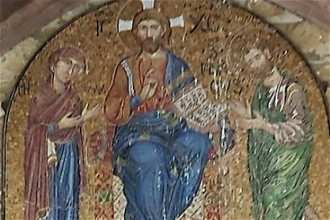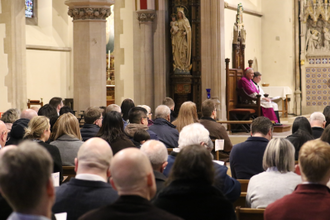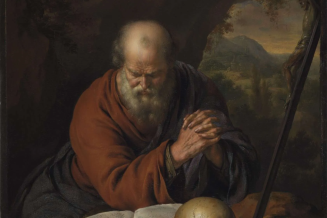Sunday Reflection with Fr Robin Gibbons - 3 October 2021
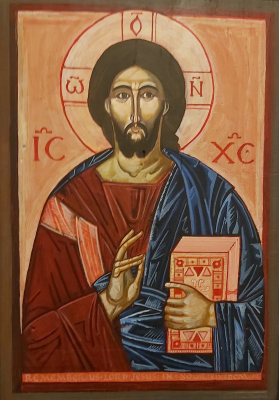
Twenty Seventh Sunday in Ordinary Time -
In my younger days the issue of divorce was still a very contentious issue, being a Catholic, and a priest, it was expected that I respond to questions concerning pastoral care, by stating the party line when asked about the Church's teaching but then showing pastoral support and concern for something that most often had irretrievably broken down. How different we are now, not only has the question of marriage been aired constantly, but we openly discuss issues about gender equality, civil partnerships, same sex partnerships, transgender issues and so on.
Today my role has to be one of deep listening rather than starting out by laying down the law, gone are the days ( even if some think that still obtains) of clergy holding the high moral position, we don't, we have failed in so many ways and have been caught out publicly, and our feet too are made of the same clay as anybody else, that insight is a good thing.
So hearing the words of Jesus in Mark stating, as we hear in our Marriage rite: 'Therefore what God has joined together, no human being must separate.' (Mk.10:9) what do any of us say? Isn't that the last word?
Well the answer is 'no it isn't' for a variety of very good reasons, the first being our rather dreadful habit of picking out gobbets of scripture to bolster our position or thoughts on a subject. With Scripture we need careful guidance, for it is not a book of law, it isn't even a book, and the Oracles of God as we see throughout the Hebrew Bible and the New Testament, also show occasions when a supposedly divine law is altered. I can think of one immediately, circumcision, abrogated, changed in the debate between Peter and Paul as found in Galatians, there is an example of immutability transformed into change!
In this Gospel, the Pharisees were probing him, trying to catch him saying something which would allow them to provoke a crisis. Hostile towards Jesus, they want his death. So they choose a very controversial question, one which was bound to draw considerable interest on the part of the people, the issue of divorce. Jesus is no fool and he knows his stuff as we might say, he is asked to make a choice between two views which were widely held, the easier teaching of the great rabbi, Hillel.who interpreted Moses, in Deuteronomy 24, to mean almost anything in a woman that displeased her husband could lead to divorce, or the school of Shammai, who taught that divorce was to be strictly limited, that only under certain defined conditions could it ever be granted. But as always Jesus takes us beyond that conundrum into the real heart of Divine Law showing us a far deeper and more important matter which we have to think out form ourselves.
The real issue, the real question, is not about divorce; but why should we invest all in sustaining marriage? That should shake us up to think hard, look at all that is around us, with our very bad track record of so many emotional problems in society, in the great differences between religious faiths, the divisions within Christianity, within Catholicism itself, poverty, the catastrophe of warfare, the immanent threat of global warming out of control, with all this, why do we wish to enter the arena of marriage at all?
The fact is that for us, the family and bond of marriage points beyond itself to the greatest mutual relationship which we need to be thinking about, that of the different layers of care, responsibility and love that we must have towards so many people and living creatures on this earth. We cannot divorce ourselves from that commitment.For a very good reason, faith and pastoral life are not lived in an abstract vacuum, knowledge, science, all kinds of insights now have to be considered, we cannot go back to the time of Jesus for one very good reason, Paul and Peter moved us into the Gentile world away from Hillel and Shammai to a wider realm of discernment by the Spirit and Community. Pay close attention to other things Jesus is saying connected to marriage, 'eunuchs for the Kingdom', no taking or giving in marriage in the `Kingdom, and lest we forget the eschaton, the end of the world!
This is the context in which we should understand Jesus' teaching on marriage, Jesus proclaims the end of divorce as the Kingdom is on the verge of breaking through and will soon be here! John Martens wrote this in an article on' A Scriptural look at Jesus' teachings on marriage and divorce in the November 2016 edition of The America Magazine: "The eschatological orientation makes sense of the teaching on marriage, for now people will be able to fulfill their vows perfectly, in large part because marriage itself will soon come to an end". He goes on to point out that; "Luke's version ( of this story) indicates that marriage is for people tied to this world not the world to come, for "those who belong to this age marry and are given in marriage, but those who are considered worthy of a place in that age and in the resurrection from the dead neither marry nor are given in marriage" (Lk. 20:34-35). That shifts a whole load of horizons.
But going back to what later happened in the Church it becomes obvious that in the end, personal, pastoral experiences combined with a strong understanding and theology of the manifestation of the Holy Spirit; prayer by the community, the decision through discernment of the assembly; particularly in that great debate in Acts, the role of Peter and Paul as apostles, all lead inexorably to a new decision, all underpin scripture in its context! As Martens puts it :'This (the Council of Jerusalem in Acts) is a fascinating decision, both because it gives us an example of the church making a practical decision about how Christians must live and because it is the decision that itself leads the Church to be less governed by prescriptions, in this case, the very Law of Moses". This continues with us today, our continued reality shows that the Church is not static, despite all our efforts to confine things, the ancient tradition grows and develops continually.
Before he became Pope, Joseph Ratzinger wrote this :…'there are magisterial decisions which cannot be the final word in a given matter as such but, despite the permanent value of their principles, are chiefly also a signal for pastoral prudence, a sort of provisional policy. Their kernel remains valid, but the particulars determined by circumstances can stand in need of correction. (328; The Nature and Mission of Theology, 106)' That is a very good quote to reflect on , it helps us make pastoral sense of our living tradition in Christ!
Lectio
Dei Verbum
Vatican II
8.This tradition which comes from the Apostles develop in the Church with the help of the Holy Spirit. (5) For there is a growth in the understanding of the realities and the words which have been handed down. This happens through the contemplation and study made by believers, who treasure these things in their hearts (see Luke, 2:19, 51) through a penetrating understanding of the spiritual realities which they experience, and through the preaching of those who have received through Episcopal succession the sure gift of truth. For as the centuries succeed one another, the Church constantly moves forward toward the fullness of divine truth until the words of God reach their complete fulfillment in her.
10. Sacred tradition and Sacred Scripture form one sacred deposit of the word of God, committed to the Church. Holding fast to this deposit the entire holy people united with their shepherds remain always steadfast in the teaching of the Apostles, in the common life, in the breaking of the bread and in prayers (see Acts 2, 42, Greek text), so that holding to, practicing and professing the heritage of the faith, it becomes on the part of the bishops and faithful a single common effort.
Extract from: A Scriptural look at Jesus' teachings on marriage and divorce
John W Martens
This is my contribution to a conversation that, frankly, has been going on since the beginning of Christianity. But it is especially important to stress: nothing has happened in the Synod on the Family which alters current church teaching on the matters of remarriage and communion for divorced Catholics. Yet if it does, it will be important to recognize that teaching can and does change on important matters, including marriage and divorce, and already has, beginning with the Gospel of Matthew. The church is the locus for change. And as much sympathy as I have for the Christian Pharisees, who saw their tradition and scriptural understanding crumble in front of them, and who argued, "It is necessary for them to be circumcised and ordered to keep the law of Moses," the church decided it was not.



